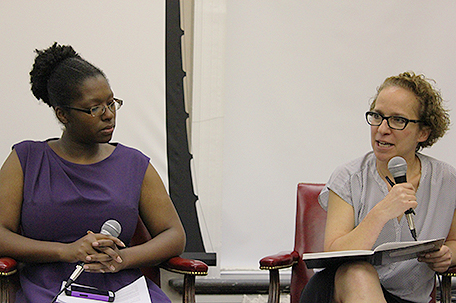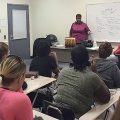
ABOVE PHOTO: Villanova University’s Judith Giesberg speaks at Artist Embedded: Their Story; Our Story – African American Women and the Fight for Freedom panel at the Historial Society of Philadelphia. (Photo: Historial Society of Philadelphia.)
By Kendall Alexander
@SteezieKBreezie
It’s not a secret most of the descendants of the Black folks residing in America today did not come here with passports in hand, their belongings on their back, and an enthusiastic spirit — there was an immense deal of loss along the way. That loss still has a seemingly permanent effect on us today — health problems, mental stagnation, and a loss of culture and identity. Black people are one of the only groups of people that have no idea what they came from, not individually at least. We have no idea what our original names were, what tongue was original to our throats, who we prayed to, or even our tribal and ritualistic customs — all lost over 400 years.
Many of us strive to fill that void by seeking pathways that help us determine who we share a common line with– through genealogy tests. These tests are rising in popularity and reconnecting families with their original ties, although some seem unhappy with results as they aren’t as fulfilling as they believed they would be.
So what happens when you want to look for missing links to your family but don’t want to go the DNA route? Villanova University history professor and graduate program director Judith Giesberg is working on a project of her own to help people find those missing branches to their family trees. I was able to ask Professor Giesberg some questions recently after a presentation at the Historical Society of Pennsylvania titled “Last Seen: Finding Family After Slavery” last month, and she gave me insight about informationwanted.org.
SUN: How did the genealogy project take shape?
JG: When I teach and research African – American history, I use a core group of digitized nineteenth century Black newspapers, particularly the Christian Recorder, published by the AME Church. For years I have been collecting these [ads from former slaves looking for family members], as I come across them, and I’ve wanted to make them available for genealogists and others who do not have access to these subscription services that university libraries have. This fall a number of hard-working graduate students in the Department of History at Villanova University began to collect the ads by reading through the microfilmed editions of various Black newspapers. Since August, we have identified and uploaded more than 1,000 of these ads and they are now available for use on the informationwanted.org
SUN: How does it work?
JG: The students read the papers to identify the ads. They then take an image of each ad and load it to the informationwanted.org. Once on the site, users transcribe the ads. Once transcribed the ads are fully keyword searchable to any who are interested in tracking down people by name, relation, place, event, or even physical description.
SUN: What are some pros and cons about the site?
JG: The pros of the site are that it is free, easy to use, and invites users to take part as citizen historians. The cons of the site are that some users have trouble registering to transcribe and, when they do, they often have questions about how to find ads that are not transcribed.
SUN: Is this project a collaboration with other universities or companies?
JG: Currently, we collaborate with Margaret Jerrido, archivist at Mother Bethel AME Church. Soon, we will hope to begin to collaborate with Dr. Carole Emberton and her students at SUNY Buffalo.
SUN: What can we expect to see from this project moving forward?
JG: We would like to add a blog feature, teacher’s kit, and some map visualizations that allow users to see the dispersal of enslaved people based on the locations mentioned in the ads.
There is an area of the website where users have offered their feedback, and everyone seems to be enjoying the process. Many have had emotional encounters with family members or located have archives they wouldn’t otherwise have had access to. Families should be encouraged by this new website, as it is an alternative to taking the pricey DNA route, and getting started with solving those genealogical mysteries.

















Leave a Comment